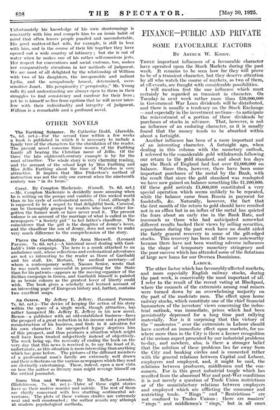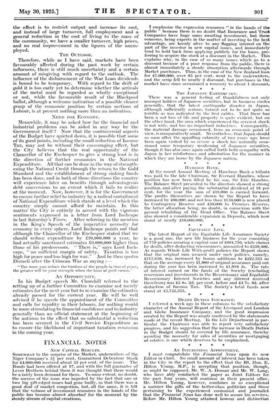FINANCE-PUBLIC AND PRIVATE
SOME FAVOURABLE FACTORS
By ARTHUR W. KIDDY.
THREE important influences of a favourable character have operated upon the Stock Markets during the past week. It remains to be seen how far they will prove to be of a transient character, but they deserve attention by all who watch the course of markets, as two of them, at all events, are fraught with considerable possibilities. I will mention first the one influence which must certainly be regarded as transient in character. On Tuesday in next week rather more than £50,000,000 in Government War Loan dividends will be distributed, and there is usually a tendency on the Stock Exchange —and especially in the investment sections—to anticipate the reinvestment of a portion of these dividends by purchases of stocks in advance. That, however, is not an influence of an enduring character, as it is usually found that the money tends to be absorbed within about a fortnight.
Another influence has been of a more important and of an interesting character. A fortnight ago, when dealing in this column with the monetary outlook, I referred to the considerable gold withdrawals following , our return to the gold standard, and about ten days ago the Bank of England had lost over £2,000,000 on balance. Since then, however, there have been some important purchases of the metal by the Bank, with the result that since the gold standard was readopted we have now gained on balance something like £1,200,000. Of these gold arrivals £1,600,000 constituted a very special operation which seems unlikely to be repeated, while the balance came from Russia in payment for foodstuffs, &c. Naturally, however, the fact that • the first month of the return to gold should have resulted not in an efflux but in an influx of the metal has quieted the fears about an early rise in the Bank Rate, and inasmuch as • those who had anticipated somewhat different results backed their views by selling securities, repurchases during the past week have no doubt aided the fairly general recovery in some of the gilt-edged stocks. This recovery has been all the more noteworthy because there have not been wanting adverse influences in the shape of temporary monetary stringency and the poor success which has attended some of the flotations of large new loans for our Oversea Dominions.
LABOUR.
The other factor which has favourably affected markets, and more especially English railway stocks, during the past week, is conceivably the most important of all. I refer to the result of the recent voting at Blackpool, where the counsels of the extremists among coal miners were turned down by an overwhelming majority on the part of the moderate men. The effect upon home railway stocks, which constitute one of the chief financial barometers of the investors' views concerning the indus- trial outlook, was immediate, prices which had been persistently depressed for a long time past rallying materially. Nor is it surprising that this victory of the " moderates " over the extremists in Labour should have exerted an immediate effect upon markets, for no- • where more than in the City is there a keener recognition of the serious aspect presented by our industrial problems to-day, and nowhere, also, is there a stronger belief that the solution of these problems lies far away from the City and banking circles and is connected rather with the general relations between Capital and Labour, employers and employed, and, it might be said, the relations between producers, middlemen and the con- sumers. For in this great industrial tangle which has resulted from the abnormal War and post-War conditions it is not merely a question of Trade Union restrictions or of the unsatisfactory relations between employers and employed which are afflicting the consumer and restricting trade. " Rings " and " Restrictions " • are not confined to Trades Unions ; there are masters' " rings ". and middlemen's " rings," but in all eases_ 0 the -effect -is to restrict output and- increase-its -cost, and instead of large turnover, full employment and a general reduction in the cost of living to the mass of the community, we have a smaller turnover, high prices, and no real improvement in the figures of the unem- ployed.
THE OUTLOOK.
Therefore, while as I have said, markets have been favourably affected during the past week by certain influences, there is still much uncertainty and a certain amount of misgiving with regard to the outlook. The influence of the disbursement of the War Loan dividends is bound to be temporary. With regard to the drift of gold it is too early yet to determine whether the arrivals of the metal must be regarded as wholly exceptional or not, while the• favourable result of the • Blackpool ballot, although a welcome indication of a possible clearer grasp of the economic position by certain sections of Labour, is at present nothing more than an indication.
NEED FOR ECONOMY.
Meanwhile, it may be asked how far the financial and industrial problems can be aided in any way by the Government itself ? Now that the controversial aspects of the Budget have quieted down, it is possible that some of its good points, including the small reduction of Income Tax, may not be without their encouraging effect, but the City believes that the real opportunity of the Chancellor of the Exchequer to give a strong lead is in the direction of further economies in the National Expenditure. All that can be done in the way of strength- ening the National Credit through the return to the Gold Standard and the establishment of strong sinking funds has been done, and in both of those directions the country will experience later on benefits through advantageous debt conversions to an extent which it fails to realize at the moment. Now, however, it is for the Government to ensure further relief to industry by a radical curtailment of National Expenditure which stands at a level which the country simply cannot afford to maintain. In this matter the City is entirely in accord with the vigorous sentiments expressed in a letter from Lord Inchcape in last Saturday's Times. After referring to the mention in the King's Speech of the imperative necessity for economy in every sphere, Lord Inchcape points out that although the Chancellor of the Exchequer stated that we should reduce expenditure by £10,000,000 a year, he had actually sanctioned estimates £9,000,000 higher than those of his predecessors. " There is," says Lord Inch- cape, " no sufficient margin of safety. Taxation is too high for peace and too high for war." And he then quotes Disraeli after the Crimean War as saying :— " The more you reduce the burdens of the people in time of peace, the greater will be your strength when the hour of peril comes."
AN OPPORTUNITY.
In his Budget speech Mr. Churchill referred to the setting up of a further Committee to examine -not merely estimates for the next near but to re-examine the estimates already passed for the current year. He will be well advised if he speeds the appointment of the Committee and calls for rapidity in their labours, for nothing would be more stimulating to financial confidence and to industry generally than an official statement at the beginning of the autumn to the effect that so substantial a reduction has been secured in the Civil Service Expenditure as to ensure the likelihood of important taxation remission in the coming year.











































 Previous page
Previous page